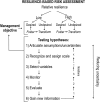Resilience in Environmental Risk and Impact Assessment: Concepts and Measurement
- PMID: 30357430
- PMCID: PMC6223862
- DOI: 10.1007/s00128-018-2467-5
Resilience in Environmental Risk and Impact Assessment: Concepts and Measurement
Abstract
Different resilience concepts have different assumptions about system dynamics, which has implications for resilience-based environmental risk and impact assessment. Engineering resilience (recovery) dominates in the risk assessment literature but this definition does not account for the possibility of ecosystems to exist in multiple regimes. In this paper we discuss resilience concepts and quantification methods. Specifically, we discuss when a system fails to show engineering resilience after disturbances, indicating a shift to a potentially undesired regime. We show quantification methods that can assess the stability of this new regime to inform managers about possibilities to transform the system to a more desired regime. We point out the usefulness of an adaptive inference, modelling and management approach that is based on reiterative testing of hypothesis. This process facilitates learning about, and reduces uncertainty arising from risk and impact.
Figures



Similar articles
-
Resilience in ecotoxicology: Toward a multiple equilibrium concept.Environ Toxicol Chem. 2017 Oct;36(10):2574-2580. doi: 10.1002/etc.3845. Epub 2017 Jun 19. Environ Toxicol Chem. 2017. PMID: 28493505 Review.
-
Integrating Resilience Assessment in Environmental Impact Assessment.Integr Environ Assess Manag. 2018 Sep;14(5):567-570. doi: 10.1002/ieam.4075. Integr Environ Assess Manag. 2018. PMID: 30489024
-
Assessing and managing freshwater ecosystems vulnerable to environmental change.Ambio. 2014;43 Suppl 1(Suppl 1):113-25. doi: 10.1007/s13280-014-0566-z. Ambio. 2014. PMID: 25403974 Free PMC article.
-
The Concept of Resilience in Ecological Risk Assessment: Scientific and Regulatory Issues.Integr Environ Assess Manag. 2018 Sep;14(5):581-585. doi: 10.1002/ieam.4080. Integr Environ Assess Manag. 2018. PMID: 30489028
-
What can ecology contribute to ecosystem-based management?Ann Rev Mar Sci. 2010;2:419-41. doi: 10.1146/annurev-marine-120308-081129. Ann Rev Mar Sci. 2010. PMID: 21141671 Review.
Cited by
-
Social vulnerability, social-ecological resilience and coastal governance.Glob Sustain. 2022 May 2;5:1-9. doi: 10.1017/sus.2022.10. Glob Sustain. 2022. PMID: 37383242 Free PMC article.
References
-
- Allen CR, Gunderson L, Johnson AR. The use of discontinuities and functional groups to assess relative resilience in complex systems. Ecosystems. 2005;8:958–966. doi: 10.1007/s10021-005-0147-x. - DOI
-
- Allen CR, Angeler DG, Garmestani AS, Gunderson LH, Holling CS. Panarchy: theory and application. Ecosystems. 2014;17:578–589. doi: 10.1007/s10021-013-9744-2. - DOI
-
- Angeler DG, Allen CR. Quantifying resilience. J Appl Ecol. 2016;53:617–624. doi: 10.1111/1365-2664.12649. - DOI
-
- Angeler DG, Allen CR, Barichievy C, Eason T, Garmestani AS, Graham NAJ, Granholm D, Gunderson L, Knutson M, Nash KL, Nelson RJ, Nyström M, Spanbauer TE, Stow CA, Sundstrom SM. Management applications of discontinuity theory. J Appl Ecol. 2016;53:688–698. doi: 10.1111/1365-2664.12494. - DOI
MeSH terms
Grants and funding
LinkOut - more resources
Full Text Sources

